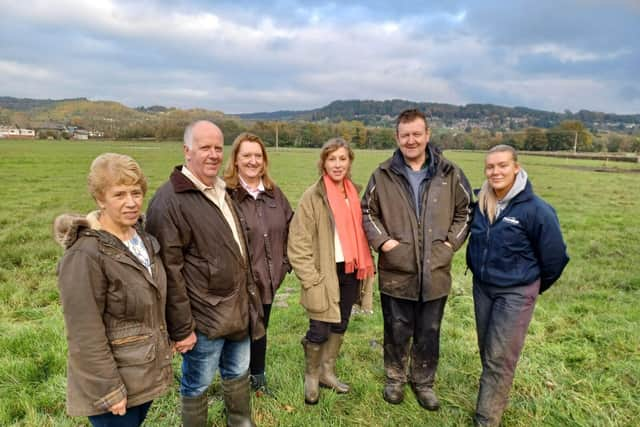Minister in Derbyshire for meeting with NFU to look at the impact of Storm Babet
and live on Freeview channel 276
The minister met NFU county adviser Andrew Critchlow, Derbyshire Dales MP Sarah Dines, and the meeting (26 October) was hosted at the home of livestock farmers John and Grace Gadsby.
They showed Ms Pow the impact of flooding on their land, discussed flood warning systems and the need for financial support when productive food growing areas are used to alleviate flooding elsewhere.
Advertisement
Hide AdAdvertisement
Hide AdJohn Gadsby said: “We looked at current environmental schemes and there is nothing in them for flood plain water storage.


“Every time the land does flood, we lose several weeks use of the fields due to the dirt and rubbish, which we have to clean up at our own expense despite reducing the flooding in Matlock which is down-stream.”
Michael Wynne and his daughter Ellie, who are neighbouring farmers, said that while the Minister was sympathetic and in listening mode, delivery was vital and they hoped to see some results.
NFU officeholders have been in the flood zone across the Midlands and said they had seen desperate scenes.
Advertisement
Hide AdThe farming community’s thoughts have also been with those who had lost loved ones in the deluge or seen their homes or businesses flooded.
Advertisement
Hide AdMr Critchlow said hundreds of acres of productive farmland had been left underwater and there was still land that was inaccessible across the region, not just in Derbyshire, but in Nottinghamshire and Lincolnshire too.
He said he was pleased the Defra Parliamentary Under Secretary of State and Derbyshire Dales MP had taken the time to see a farm that was regularly flooded, and it was important as it was becoming a frequent occurrence.
“In high rainfall events a lot of water is stored on farmland, but farmers are not being rewarded for that public good and this was a good example for the Minister to see,” he said.
Advertisement
Hide Ad“Farming is on the front line of climate change and the sector is experiencing volatility and severe weather events more often.”
The NFU has called for the Government to value the nation’s food production and how water infrastructure is managed.
Advertisement
Hide AdNFU Deputy President Tom Bradshaw said: “We absolutely need a long-term plan to improve how we manage water in times of flood and drought, as we regularly experience both on an annual basis, and both severely impact our ability to produce food.
“A comprehensive water management strategy should set out how we can collaborate better with government, as well as local authorities, water companies and Environment Agency; one that allows farmers and growers to be part of the solution and take on-farm action. A strategy that prioritises food security recognising that domestic food production is part of the critical national infrastructure.
Advertisement
Hide Ad“Central to this will be significant investment with ambitious upgrades of ageing rural flood defences, drainage and waterways as well as regular maintenance. We also need to look at where farming protects adjacent urban areas by absorbing and holding flood water at personal cost to the farms themselves. These businesses must be reimbursed for the public goods being provided on the back of government decisions made.
“A serious commitment by government and regulatory authorities to plan, upgrade and invest in the nation’s water management and infrastructure will have benefits for everyone, including our farmers and growers, so they are able to continue producing climate-friendly sustainable food.”
The NFU believes that an integrated water management strategy should be developed which gives farmers and growers a central role in the better management of land to improve water quality and the better management of water to tackle the dual challenges of floods and droughts – while enabling them to keep feeding the nation.
Advertisement
Hide AdMs Dines said it was important farmers were supported as they often suffered the brunt of water runoff from built up areas and flooding when inclement weather occurs.
Advertisement
Hide AdShe said: “I am very pleased the Minister left Derbyshire Dales having heard this message loud and clear.
I will continue to press the Minister and government to look into how best to support farmers dealing with flooding.
“Thank you of course to Mr and Mrs Gadsby for hosting and to Michael Wynne and his daughter Ellie for describing the difficulties they faced at their neighbouring farm.
“Accounts such as these really emphasise why our farmers need flooding support. I want to thank the whole of the Derbyshire Dales farming community for working together and supporting the wider community in the recent floods.”